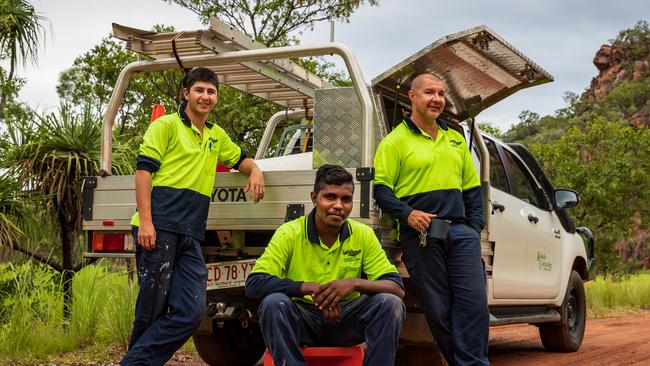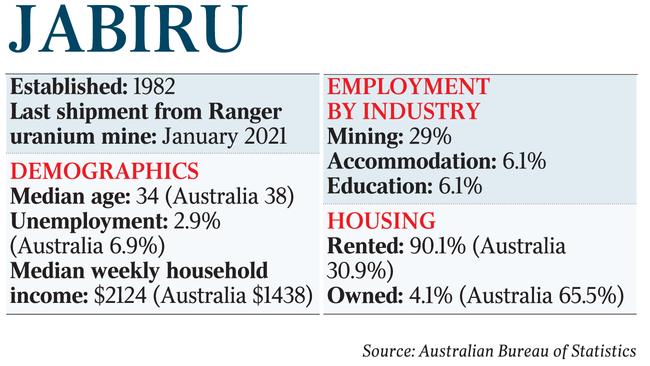Tradies left in limbo in temporary NT town of Jabiru
Richard Mitchell is the sort of bloke any struggling outback town might need.

Richard Mitchell is the sort of bloke any struggling outback town might need.
He grew up in the Kakadu service centre of Jabiru, earned his certificates at a local business, and after a successful career in Darwin and elsewhere has returned home to give back.
In 2018, Mr Mitchell bought Kakadu Contracting, Jabiru’s only tradie business. The firm was flagging, but he has since quadrupled its staff from three to 12 (half of them Indigenous) and boosted turnover by 40 per cent.
He has got three apprentices, all local lads to whom he hopes to pass on the sort of liberating opportunities he had.
Kakadu Contracting could be a rare example of a successful remote private enterprise, making it troubling that everyone involved is now embroiled in Jabiru’s existential crisis.
The cookie-cutter mining settlement was set up in the early 1980s for workers at the Ranger uranium mine. Now, 40 years on, Energy Resources Australia is preparing to leave, and most people are unsure what to expect.
Governments and a local Aboriginal corporation have released glossy brochures pitching Jabiru as a tourism hub. But as handover day approaches, the population of the town built for about 3000 has dwindled to just a few hundred.
Jabiru is slated to be signed over to the Mirrar traditional owners under a deal between Canberra, the Northern Land Council and the Northern Territory government.
The unwieldy co-ordination has so far yielded publicity stunts but few practical results.
With five months left, Mr Mitchell, who is Aboriginal but not a Jabiru traditional owner, has no idea what terms he might be offered to lease workshop space and staff accommodation. His firm competes with those in Darwin, and he fears losing out.
“I’ve been begging for even some in-principle agreement,” Mr Mitchell said. “It’s hard to get a business model going forward … if we can’t get satisfactory terms, we’ll have to walk away.”
A schedule of rates circulated last year suggests housing rents could rise by two-thirds by 2030, which Mr Mitchell and others think is unviable. “How am I going to get people to live in Jabiru, where you can’t even get a decent coffee in the morning?”, he protests. “How are my trainees going to afford those rents?”
Apprentices Jason Cunningham and Riley Christophersen would be sorry to see their hard work go to waste if Kakadu Contracting left. “It would suck big time,” Mr Christophersen said. “To have to start all over again would be really tough.”
Down the road, one of Jabiru’s oldest residents, Helmut Maierhoffer, 76, occupies what’s understood to be the only privately owned dwelling sitting on the expiring Jabiru head lease. He bought the property 20 years ago, expecting it to be his last.
“I could lose everything I’ve got in my life,” he said.
Government sources insist the handover negotiations are on track and say no one will be kicked out. Mr Maierhoffer, who was last year given a report implying he might need to pay $14,000 to repair his home or $30,000 to demolish it, does not feel reassured.
The NT government last month appeared to backflip on plans to bulldoze Manabadurma, a rundown Jabiru camp. An official report had suggested everyone living there would be forced to leave as the traditional owners did not want them, but a December directive stated the opposite.

“We don’t know what’s going to happen,” resident Jaylene Nadjamerrek, said.
NT Housing Minister Chansey Paech’s office did not respond to a request for comment. But Jabiru Kabolkmakmen, a body established to negotiate new tenure in Jabiru, blamed the lack of a new head lease for uncertainty around subleases.
“The finalisation of the new township lease is a matter for the commonwealth,” it said. “The issue for resolution relates to the need for extensive remediation of infrastructure in the town.”
A spokesman for Environment Minister Sussan Leys said everyone was striving to ensure the new Jabiru head lease would be finished on time.
“Key stakeholders are investing a very significant amount of resources (including $276m from the commonwealth alone) into Jabiru and Kakadu to ensure that this transition takes place on June 30 is as smooth as possible, and that our shared vision for Jabiru as a thriving National Park town, tourism hub and regional services centre is realised,” he said.
NT Aboriginal Affairs Minister Selena Uibo said her government was “getting on with the job on setting up Jabiru for its post-mining future”.


